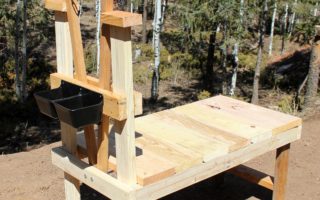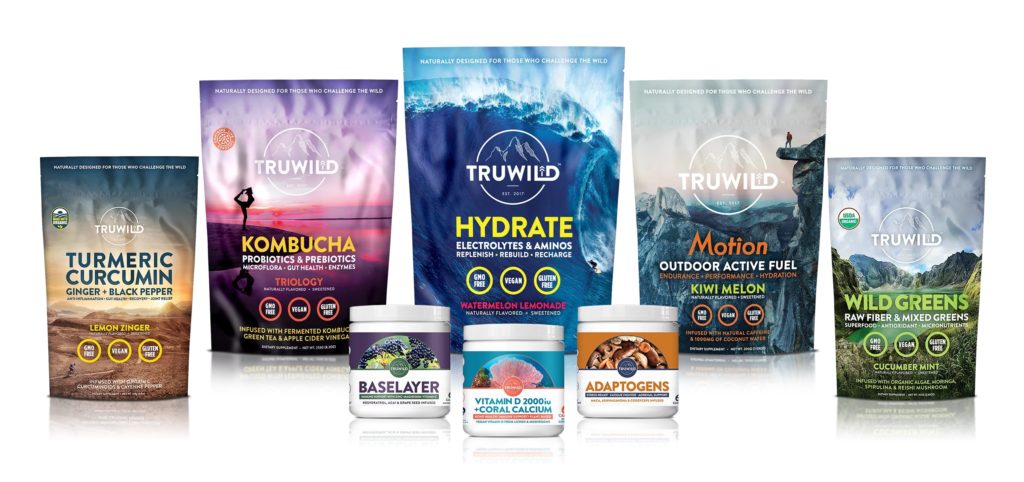People are starting to wake up to the growing problem of all the waste created by our trash. It’s very easy to go about your day to day and overlook this increasingly growing issue. If you’re ever traveling to other countries like Ireland, it’s quite strange to see how differently things are sold there. Bread, candy, produce . . . are all sold in bulk bins without plastic wrappings.
Between one kid, my husband, and myself, we produce about one 30-gallon trash bag full of trash every 1-2 weeks, and a bag of recyclables about every 2 weeks. We continually try to reduce this and find ways to improve. I’d like to share some of the ways we’ve tried to help reduce our waste . . .
 #1 Reusable Grocery And Produce Bags: This is easy to do and is something more people should try to commit to. The tricky part is remembering to put them back into the car after you’ve unloaded your groceries. Otherwise, they may get forgotten at home the next time you go shopping.
#1 Reusable Grocery And Produce Bags: This is easy to do and is something more people should try to commit to. The tricky part is remembering to put them back into the car after you’ve unloaded your groceries. Otherwise, they may get forgotten at home the next time you go shopping.
#2 Reuse Plastic Grocery Bags: It’s best to not have these at all, but when we do find ourselves with plastic grocery bags because we forgot our reusable ones, we find ways to re-purpose them. We’ll use them for things like our small garbage cans or as doggy poop bags.
#3 Recycling: Another common practice, we do recycle cans, plastic, glass, and paper products (unless it’s winter, then we burn the paper). Our garbage pickup only allows one bag each week of recyclables which is unfortunate. But as it takes us a couple of weeks to build up enough for pickup it works for us. It’s worth noting that not all plastics are recyclable. On the bottom of many products you’ll see a triangle with arrows and usually a number 1-7 that designates the different types of plastics. A lot of times those with the number 7 aren’t recyclable but you can check with your local recycle company.
#4 Fire Starter: We use a cast iron stove in the winter to stay warm. We’ll collect cardboard, junk mail, and other paper products for fire starter. Afterwards, when enough ash has built up, we either spread the ashes around our garden, meadow, or we’ll compost it.
#5 Burning Dead Wood: This one’s not perfect as burning wood creates its own emissions, BUT it has its pros. We’re not creating enough power yet to keep us warm in the winter, so we use our cast iron stove. We’ve got a lot of dead wood all over our property that creates a fire hazard each summer. My husband hikes the mountain 3X’s a day with the dogs and drags down a dead tree each time to be chopped up and turned into firewood. This helps clear the woods, keeps us warm in winter, reduces our need for propane/natural gas. Again, the ashes are spread out to bring nutrients back to the ground.
 #6 Buy In Bulk & From Bulk Bins: We try to buy things like oatmeal, rice, beans . . . in 25-50 lb bulk bags instead of going through several smaller packages of the same thing. It’s also delivered in paper vs plastic packaging. We’ll also buy what we can from bulk bins in the stores. I’m currently working on buying reusable silicone bags vs the plastic cellophane bags for when I’m buying the bulk flours I need for my gluten free flour mix.
#6 Buy In Bulk & From Bulk Bins: We try to buy things like oatmeal, rice, beans . . . in 25-50 lb bulk bags instead of going through several smaller packages of the same thing. It’s also delivered in paper vs plastic packaging. We’ll also buy what we can from bulk bins in the stores. I’m currently working on buying reusable silicone bags vs the plastic cellophane bags for when I’m buying the bulk flours I need for my gluten free flour mix.
#7 Using Containers Over Zip Lock Baggies: Whether it be sandwiches, fruit, snack packs . . . we try to use containers for everything we need to store. This can be challenging when it comes to fridge space as we have a smaller than average refrigerator.
#8 Buying Quality Products Vs. Cheap: Things are made quite cheaply nowadays and are meant to break down so that you’ll need to buy a new one quickly. We do our best to seek out durable items that will stand the test of time.
#9 Wear Clothes/Shoes/Undergarments Until They’re Dead: Working on a homestead we don’t exactly care about fashion and owning the latest and greatest. You may not realize it but a lot of resources go into the textile business. We get clothes from thrift stores and use them until you can either see through them, or they’re full of holes. Sometimes even then, it takes a while before they’re finally thrown out.
#10 Reusable Diapers: Yes, even little baby is cutting out trash by using reusable diapers. This saves both on garbage and on buying traditional throw away diapers. Current designs make reusable diapers user friendly and easy to use.

#11 Sprouted Chicken Feed: This is difficult to do in the winter, but in the warm season when the weather gets nicer, we sprout our chicken feed as much as possible. It’s healthier for the birds, and reduces how often we need to buy feed. Sprouting makes the feed go 2-3 times further, which also saves us money. When we’re able, we’d like to even take it a step further and grow fodder which will stretch it even further.
#12 Free Ranging The Animals: The more we’re able to have our animals’ free range and eat what the land provides, the less feed we need to buy for them. This saves us on money, packaging, and is healthier for the animals.
#13 Use Chickens And Rabbits To Our Advantage: We never have food waste to throw away. Greens, broccoli/cauliflower stalks, and fruit/vegetables cutting go to the rabbits. Older greens and food scraps that are NOT rotten go to the chickens.
 #14 Compost Everything Else: Rotten Food, banana peels, eggshells, coffee grounds, animal waste/bedding, these all go to our compost pile.
#14 Compost Everything Else: Rotten Food, banana peels, eggshells, coffee grounds, animal waste/bedding, these all go to our compost pile.
#15 Growing, Making, and Baking Our Own Food Products: It is surprising how many things are put in one use plastic bags until you look around . . . tortillas, bread, milk . . . we try to bake our own goods as much as we can. Especially with me being gluten free, it saves money mixing my own flour and baking. With the goats, we are able to seasonally have milk and make our own cheese, butter, and ice cream. Chickens provide us eggs. Meat rabbits provide the occasional meat which we don’t generally buy otherwise. As a young homestead, we’re still looking to the future on a good working garden. This will also help with cost and avoid store packaging.
#16 Switching To Glass, Stainless Steel And Cast Iron: Teflon non-stick pans have a short lifespan. Cast iron, stainless steel and glass should last you a lifetime, and won’t need to be replaced. They can be more challenging to cook with at times but are worth it. You also don’t get the dangerous fumes of the Teflon pans. They can be expensive when purchased brand new, so we go to the thrift stores where they can be bought at an excellent bargain.
#17 Opting For Canvas Tarps: Canvas tarps will last much longer than the typical tarps you buy at the store, even longer than the heavy duty ones. They come with a cringing price tag, but they will last a very long time and reduce plastic waste when the lifetime of the product is reached.
 #18 Minimalists: We’re not big consumers. There’s a lot of things that we live without that you might find in a typical family’s home. This includes things like TV, entertainment centers, excess toys, or equipment. We try to donate anything we are not using to the Goodwills or local thrift stores while they still have some use in them.
#18 Minimalists: We’re not big consumers. There’s a lot of things that we live without that you might find in a typical family’s home. This includes things like TV, entertainment centers, excess toys, or equipment. We try to donate anything we are not using to the Goodwills or local thrift stores while they still have some use in them.
#19 Reuse Feed Bags: We don’t just throw away feed bags for the chickens, rabbits, dogs, goats. We reuse them as garbage bags, or we have a neighbor that turns certain kinds into tote bags and sells them online.
#20 Stainless Steel Reusable Water Bottles: A common one that’s easy to do. I’ve been using my same reusable stainless steel water bottle for years. My husband loves his couple of bottles that he uses for coffee, especially on trips. He’ll fill them up at the gas stations instead of using the throw away cups. We honestly don’t see how people use plastic cups/bottles as they contaminate you with micro plastics.
#21 Dine In: We try to only eat out once per month as a date night, otherwise the cost adds up. Instead of take out, we’ll dine in and order only what we’re going to eat in one sitting so that we aren’t taking or using single use styrofoam containers. Something else we could do is bring some of our own containers from home in the event that we did have leftovers.

#22 Limit Travel: As we live in a more remote location, we are about a 45 minutes’ drive from town. So we only go into town once per week to get everything we need like fuel, food, animal feed, library, laundry, hardware . . . We also limit trips to visit family both for cost, to save wear and tear on the vehicle, and it helps lessen emissions.
#23 Wear Clothes More Than One Day: If it’s been an easy-going day and we didn’t get that dirty, then we’ll wear clothes for an extra 1-2 days before changing into new clothes. We’re just home hanging with the critters so it’s not too bad.
#24 Less Laundry: In extending the wear time of our clothes, we also don’t end up having to do laundry as often. Before the baby, we did laundry once about every 3 weeks. With the addition of the baby and the reusable diapers, we then had to do a small load of laundry at least once per week.
 #25 Limit Water Usage/Utilize Winter Ice: As we have to truck our water in and don’t yet have a well, water is precious and is used wisely. In winter, we get even less water at a time because it’ll freeze. Sometimes we’ll end up needing to melt ice down for the animals to drink.
#25 Limit Water Usage/Utilize Winter Ice: As we have to truck our water in and don’t yet have a well, water is precious and is used wisely. In winter, we get even less water at a time because it’ll freeze. Sometimes we’ll end up needing to melt ice down for the animals to drink.
#26 Bathe Less Frequently: Again, this comes down to limited water, but we also don’t have a typical shower. In winter it’s more like sponge baths 2-3 times per week, using a bin of water to wash our hair. In summer we use can use an outdoor solar shower. It’s one of those camping shower bags that heats up in the sun before you use it. Otherwise, we’ll get the opportunity to shower when we visit family, get hotels, or visit the local aquatic or recreation center. Even when we do visit family for 1-2 weeks at a time, we’ll shower once every other day or every 2 days just out of habit.
#27 Cleaning Via ACV Vinegar & Boiling Water: With no running water, we have to wash our dishes differently. We try to limit ourselves to one of each utensil per person. Each day, with only a few dirty items, it makes it easy to boil them clean for use the next day. For counter tops and such, I use a mixture of 1/2 ACV, 1/2 water in a spray bottle to clean with. This uses no chemicals and uses beneficial microbes for the environment. The use of traditional bacterial soaps has aided in the creation of super-bugs.
#28 Solar Power: We are 100% solar. In doing so, we have removed ourselves from electricity, which is made via burning coal, creating nuclear waste, etc. We have additional plans for wind generation in the future.
 #29 Events/Gatherings: Whenever we go to events or gatherings where there’s lots of people and food. I try to encourage everybody to put there food scraps in a specified bowl to feed to our chickens so that nothing goes to waste.
#29 Events/Gatherings: Whenever we go to events or gatherings where there’s lots of people and food. I try to encourage everybody to put there food scraps in a specified bowl to feed to our chickens so that nothing goes to waste.
#30 The Holidays: This is a tough one, but we try to gift things that are needed verses frivolous. That sounds like no fun, but on the contrary, it’s usually things we both want and need. Instead of wrapping paper, we try to reuse any holiday bags that we’ve gotten as gifts from others. Wrapping paper can be used for fire starter if we do use it.
We’re not perfect but we’re still trying to make a difference wherever we can. Some of these are active efforts while others are due to circumstance. It takes one family at a time to decide to change and take steps to reduce their own waste. We’ll continue to learn new ways that we can reduce waste and help make others aware of what they can do to help. It can only be ignored for so long.









